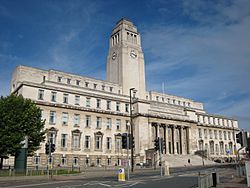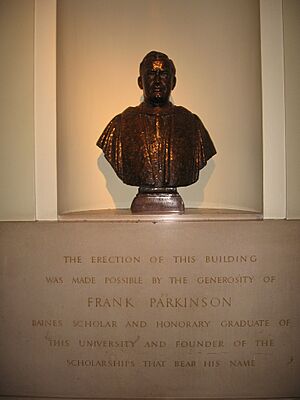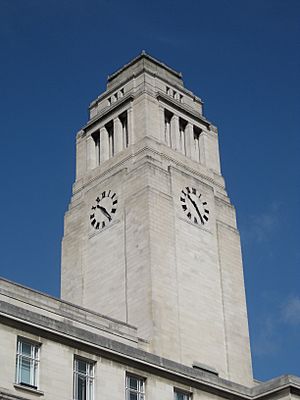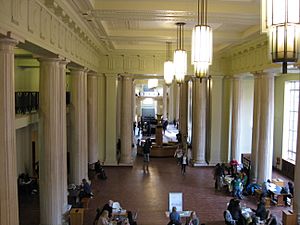Parkinson Building facts for kids
Quick facts for kids The Parkinson Building |
|
|---|---|

Parkinson Building August 2017
|
|
| General information | |
| Architectural style | Greek Revival |
| Location | Leeds, West Yorkshire |
| Country | England |
| Coordinates | 53°48′29″N 1°33′11″W / 53.808°N 1.553°W |
| Construction started | 1938 |
| Completed | 1951 |
| Cost | £200,000+ |
| Client | University of Leeds |
| Design and construction | |
| Architect | Thomas Arthur Lodge and Thomas Geoffry Lucas |
The Parkinson Building is a famous building at the University of Leeds in West Yorkshire, England. It is a very important building, known as a Grade II listed site. This means it is protected because of its special history and design. The building looks like old Greek temples, a style called Greek Revival.
The tallest part of the building is its clock tower. It stands 57 metres (187 feet) high! This makes it one of the tallest buildings in Leeds. You can see the tower from far away, even from the M621 motorway. Because it's so easy to spot, the tower has become a symbol of the university. In fact, the university logo even features the clock tower.
The building is named after Frank Parkinson. He was a very generous person who gave £200,000 to help pay for the building. Work started in 1938, but it stopped because of World War II. Construction began again and finished in 1951. The building was officially opened on November 9, 1951, by the Princess Royal. She was the leader of the university at the time.
Contents
Building History
The idea for a new building at the university came about in the early 1900s. Two talented architects, Thomas Arthur Lodge from Scotland and Thomas Geoffry Lucas from England, designed it.
One day, a former student named Frank Parkinson saw the plans. He was a successful electrical engineer and businessman. He was so impressed with the design that in 1936, he offered to donate a huge sum of £200,000. This money helped pay for the main entrance hall and the famous clock tower.
Building work started in 1938. However, the start of World War II in 1939 paused everything. Construction finally finished 13 years later, in 1951. The building was officially opened by the Princess Royal on November 9, 1951. She was the Chancellor of the university from 1951 to 1965.
What's Inside Today?
The Parkinson Building is a busy place today. It has many services for students and staff. It also has things that the public can enjoy.
Parkinson Court
The main hall, called Parkinson Court, was updated in 2004. It looks beautiful and leads to the Brotherton Library. This library opened in 1936. It holds many books and resources for arts, social sciences, and law subjects.
Art and History
The Parkinson Building is home to the University of Leeds Art Collection and Gallery. You can visit it for free! It has a wide range of art, including paintings, drawings, and sculptures. They also have special temporary exhibitions.
The building also stores amazing historical items. These include a very rare copy of William Shakespeare's First Folio. This book was published in 1623 and is worth a lot of money. You can also find old letters and writings by famous Victorian writers like the Brontë sisters. There are even hundreds of letters written to the French poet Victor Hugo.
University Identity
In 2006, the university decided to update its look. They created a new logo that features the Parkinson Building's clock tower. This new logo replaced older designs. It helps everyone recognize the university easily.
Services and Spaces
Today, the Parkinson Building houses many important university departments. These include:
- The Stanley and Audrey Burton Art Gallery
- Classics department
- Course Enquiries Office
- History department
- Institute for Medieval Studies
- Language Centre
- University Archives
- Coffee Bars
- Computer areas for students
The main hall, Parkinson Court, has a special design. It has a very tall ceiling in the middle, right under the clock tower.
 | William L. Dawson |
 | W. E. B. Du Bois |
 | Harry Belafonte |




